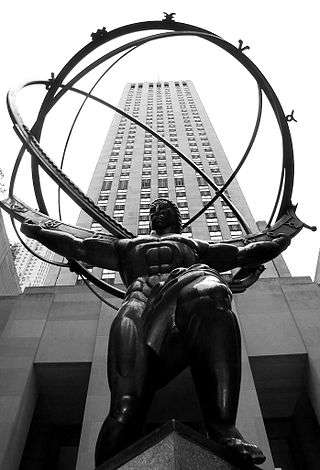Harry Binswanger
Harry Binswanger (/ˈbinzˌwæŋər/; born 1944) is an American philosopher. He is an Objectivist and was an associate of Ayn Rand, working with her on The Ayn Rand Lexicon. His recent (February 2, 2014) book is How We Know: Epistemology on an Objectivist Foundation. A past columnist for Forbes Online, he is currently a Senior Contributor at RealClearMarkets.
Binswanger's doctoral dissertation, in the philosophy of biology, presented a new theory of the goal-directedness of living action, in opposition to the views of one of his dissertation advisers, Ernest Nagel. The dissertation was later published as The Biological Basis of Teleological Concepts. He taught philosophy at CUNY's Hunter College from 1972 to 1979 and at other New York City schools as well as at the University of Texas, Austin for a semester in 2002. Since 1997, he has operated a fee-based email discussion group on Objectivism.[1] Binswanger has spoken on Objectivist philosophy at over 30 universities, across the U.S., Canada, and abroad. His television appearances have included the Glenn Beck show, Geraldo at Large, and CNBC's Closing Bell. He also appears in Ayn Rand: A Sense of Life, the Academy Award nominated documentary by Michael Paxton, and Ayn Rand & the Prophecy of Atlas Shrugged, a documentary film by Chris Mortensen (2011).
Biography
| Objectivist movement |
|---|
 |
|
Theorists |
|
Born and raised in Richmond, Virginia, Binswanger received his Bachelor of Science degree in "Humanities and Engineering" from the Massachusetts Institute of Technology (where he was instrumental in establishing the student group "Radicals for Capitalism") and earned his Ph.D. in philosophy from Columbia University in 1973.
Binswanger was a close friend of Ayn Rand in the final years of her life, and his subsequent philosophical work has been done in the Objectivist tradition.[2] He edited the new material in the second edition of Rand's book, Introduction to Objectivist Epistemology, published in 1990 after her death (the first edition was published in 1979) and frequently contributes to Objectivist publications. He also compiled The Ayn Rand Lexicon, a mini-encyclopedia of Rand's views on some 400 topics in philosophy—now available online.[3]
His book, The Biological Basis of Teleological Concepts, was published in 1990, and How We Know: Epistemology on an Objectivist Foundation was published in 2014, and he has given many lecture courses developing Objectivist theories in metaphysics, philosophy of mind, and philosophy of science. These include "Free Will", "Abstractions from Abstractions", "The Metaphysics of Consciousness", "Consciousness as Identification," "Selected Topics in the Philosophy of Science," "Psycho-Epistemology," and "Philosophic Issues in Economics."
From 1980 through 1987, he published and edited a bimonthly journal called The Objectivist Forum, which was subsequently published as a hardback collection.[4]
Binswanger is currently on the Board of Directors of the Ayn Rand Institute, and is a professor at its Objectivist Academic Center. He also moderates and regularly posts to an email discussion group on Objectivism, called "The Harry Binswanger Letter," or HBL.[1]
Binswanger was born into a Jewish family, but he opposes all forms of religion, "ethnicity," and clinging to traditions. Binswanger is a scion of Binswanger Glass Co., founded in 1872 by Samuel Binswanger.[5]
Views
Binswanger has been described as an "orthodox" Objectivist who is committed to ideas of his mentor, Ayn Rand, whom he considers a "once in a millennium genius."[2] Binswanger expressed support for Israel on the Glenn Beck program on Fox News and opposition to the theory of Global Warming/Climate Change in his Forbes Online Column of April 3, 2013.[6] He calls for absolutely open immigration in a "white paper" on his website.[7]
Works
As author
- Binswanger, Harry (2014). How We Know: Epistemology on an Objectivist Foundation. New York: TOF Publications, Inc. ISBN 978-0-9856406-1-3.
- Binswanger, Harry (1990). The Biological Basis of Teleological Concepts. Los Angeles: Ayn Rand Institute Press. ISBN 0-9625336-0-2.
- Hull, Gary, ed. (2005). "'Free Competition' at Gunpoint". The Abolition of Antitrust. Transaction Publishers. ISBN 0-7658-0282-1.
- Ralston, Richard E., ed. (2011). "The Dollar and the Gun". Why Businessmen Need Philosophy. Irvine, CA: Ayn Rand Institute Press. ISBN 0-9625336-2-9.
- Ralston, Richard E., ed. (2011). "Philosophy: The Ultimate CEO". Why Businessmen Need Philosophy. Irvine, CA: Ayn Rand Institute Press. ISBN 0-9625336-2-9.
As editor
- The Objectivist Forum. Vols 1–8, 1980–1987. LCCN 83-640866
- Rand, Ayn (1986). The Ayn Rand Lexicon: Objectivism from A to Z. New York: New American Library. ISBN 0-453-00528-4.
- Rand, Ayn (1990). Introduction to Objectivist Epistemology. Co-edited with Leonard Peikoff (2nd ed.). New York: Meridian. ISBN 0-453-00724-4.
See also
References
- 1 2 Harry Binswanger. "HBL".
- 1 2 McConnell, Scott, "Harry Binswanger," 100 Voices: an Oral History of Ayn Rand, 2010, New American Library, pp. 575–611.
- ↑ Harry Binswanger. Lexicon "The Ayn Rand Lexicon: Objectivism from A to Z" Check
|url=value (help). Ayn Rand Institute. - ↑ Harry Binswanger (ed.). "The Objectivist Forum".
- ↑ Myer Solis-Cohen (1957). The American descendants of Samuel Binswanger. Myer Solis-Cohen. ASIN B0007HGOJC.
- ↑ Harry Binswanger (April 3, 2013). "Global Warming: Was It Just A Beautiful Dream After All?". Forbes.
- ↑ Harry Binswanger (2010). "Open Immigration". TOF Publications.
External links
- The Harry Binswanger List
- Ayn Rand Institute, pages referencing Harry Binswanger
- Harry Binswanger's page and list of articles at the Capitalism Magazine website
- Ayn Rand Institute page with written material and lectures from Dr. Binswanger